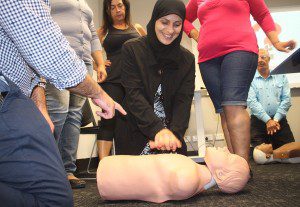
Performing Cardiopulmonary Resuscitation (CPR) can help save a life, often that of a family member or friend.
However, for those whose first language is not English, it can be more difficult to access and understand the information and find training courses available.
After seeing a few incidences of young Arabic men who had died from an out of hospital cardiac arrest when they could have potentially been saved, Liverpool Hospital Emergency staff specialist Dr Ben Taylor decided to develop a CPR training program for Arabic speakers.
“I was touched by what I had witnessed and started looking into multilingual CPR training resources, however I was unable to find any in Australia,” Dr Taylor said.
According to the Heart Foundation, there are 9,000 Australians who die of heart attacks each year, (the most common cause of a cardiac arrest).
A figure which Dr Taylor said could potentially be reduced if more people are able to know how to recognise a cardiac arrest if someone collapses, call an ambulance, perform effective CPR and know what they should do until an ambulance arrives.
The 2011 census shows that 36 percent of south west Sydney residents were born overseas, compared with 26 percent in the state.
Arabic is the most commonly spoken language other than English in south west Sydney with 40 percent of Arabic speaking people in NSW living in this region.
“We’ve chosen to teach the chest compression-only form of adult CPR as not everyone is comfortable with giving mouth to mouth resuscitation to a stranger; plus the compression only method is easier to learn and thought to be just as effective in the short term,” Dr Taylor said
“With some cultures there can be a question of trust when it comes to health care, especially if they feel it is in a language they are not fully proficient in.
“Offering training programs like this in a native language allows the participants to feel more confident in understanding what’s being taught, how and who from,” he said.
Although the program is still in its pilot stages, Dr Taylor said that he has had a great response from previous participants who are given all the necessary resources to teach others what they’ve learnt when they complete the training.
[social_quote duplicate=”no” align=”default”]“Training program such as this help to overcome potential cultural barriers through allowing access to skills in a native language that could help save a life.[/social_quote]
“We give everyone who attends a USB stick with a copy of the translated slides from our presentation as well as videos with Arabic subtitles and other information which they may find useful for teaching others in their community about how to administer CPR.”
Participants have included people from Sudan, Iraq, Lebanon and Egypt.
As part of the training, they are shown photographs of where to find automatic external defibrillators and teach them what they do and how to use them.
“We hope that training native Arabic speakers who are settled in their community will mean they can then assist in passing on this knowledge to others,” he said.
For more information or to register your interest in attending a training session please contact Janet Harrison on 8738 8417.
